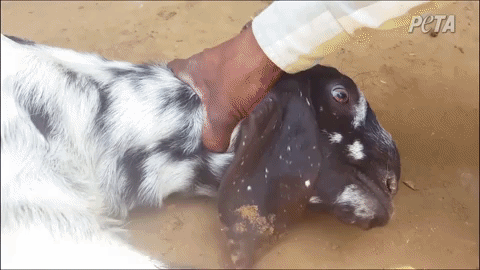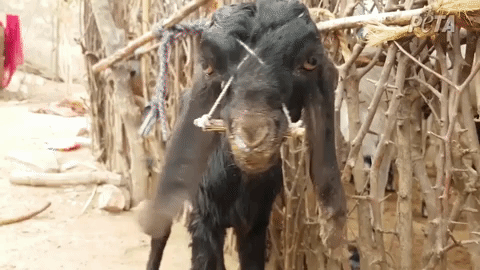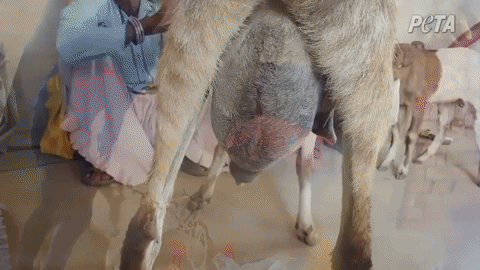Charity or Cruelty? Watch PETA’s New Video About Animal-Gifting Programs, Then You Decide
Don’t be fooled by organizations like Heifer International and their animal-gifting programs. Marketed as initiatives that help eliminate poverty, these organizations make it seem as if donated goats and other animals become treasured members of human families. But in reality, these programs often add to overall suffering rather than reducing it. Take a look:
Gifted or Not, Animals Suffer and End Up at the Slaughterhouse
Around the world, animals raised for food are exploited in a variety of ways. They are forced to undergo cruel procedures such as dehorning and castration without any painkillers. Many are left chained or penned in small spaces or suffer from lingering illnesses or injuries. And when they are no longer considered useful, these animals often face grueling journeys to slaughter on extremely crowded transport and meet a gruesome end when their throats are cut with a blunt knife. The animals who are donated to marginalized communities by animal-gifting charities typically aren’t spared such suffering.

In a 2018 joint investigation by PETA and Sentient, an eyewitness visited dozens of families in villages throughout Rajasthan, India, where goats donated by Heifer International commonly join those already used by farmers for breeding. The observer documented how baby goats were denied the milk that was meant for them.

Other goats were found suffering from serious conditions, none of which were properly treated. While a paraveterinary worker from Heifer International’s partner organization SPECTRA may occasionally give advice on keeping goats or provide basic veterinary services, the animals’ treatment is left largely up to the villagers, who can be unwilling or unable to offer even a minimal level of care. During PETA and Sentient’s investigation, at least two families in the area where Heifer International operates admitted that they couldn’t afford to take care of the goats.

The investigation found that the villagers who receive the goats often sell them for slaughter through a farmer producer organization—a legal entity in India that deals with the business activities of a group of farmers. Once the animals are taken to slaughterhouses and roadside butcher shops, they are made to stand on blood-drenched floors covered with intestines and internal organs. As they’re forced to wait in fear, they can’t help but see their friends being killed right in front of them. The slaughterhouse workers don’t stun them before killing them—even though the law requires it.
Eating Animals Increases Human Hunger Around the World
Animal agriculture is the least efficient way to feed the world’s hungry. It takes up to 16 pounds of grain to produce 1 pound of meat. Feeding people vegan foods instead of animal-derived ones is a far more efficient and productive way to meet the nutritional needs of a community. The human body can obtain all necessary proteins, minerals, and complex carbohydrates from sustainable crops of vegetables, grains, legumes, nuts, and fruits.
Putting More Strain on Humans
Gifted animals can be an extra burden for communities already struggling for resources like food and water or dealing with harsh environmental pressures such as drought. If a family is having difficulty providing for itself, how can it ensure that animals have adequate living conditions, nutrition, and medical care?
Meat and the Environment
In addition to requiring more resources to produce less food, animal agriculture also has severe negative effects on the environment. It is undisputed in the scientific community that raising animals for food can lead to deforestation and exacerbate drought.
John Burton, director of the World Land Trust, called it “madness” to send goats, cows, and chickens to areas where they will add to the problems of drought and desertification.
“The goat campaign may be a pleasing gift and a short-term fix for milk and meat for a few individuals, but in the long term the quality of life for these people will slowly be reduced with devastating effect.”
—World Land Trust Director John Burton
Heifer International: Putting Humans’ Health and Wellbeing at Risk, Too
A lack of adequate veterinary care can harm humans, too. Chickens and other animals are susceptible to zoonotic diseases like bird flu, swine flu, and others that are transmissible to humans around them. Plus, eating meat is extremely harmful to human health. According to the Academy of Nutrition and Dietetics, vegans and vegetarians have lower rates of heart disease, obesity, diabetes, and several types of cancer than do meat-eaters. Medical reports constantly blame the “Westernization” of diets (i.e., more meat, eggs, and dairy and fewer whole grains, vegetables, and beans) for the skyrocketing rates of heart disease, obesity, and diabetes that nations such as China and India are grappling with.
Responsible hunger-relief charities know that the only way to alleviate hunger while benefiting people’s overall health is to encourage them to consume plant-based foods.
Empowering Communities Without Harming Animals
There are many compassionate ways to help communities that don’t condemn animals to suffering and death. Heifer International already has such programs in place and could easily shift its focus away from using animals to supporting those other initiatives, which include the following:
- Providing access to marketing opportunities for locally produced items
- Teaching literacy
- Installing irrigation pumps and providing training in water management
- Supplying fruit and vegetable seeds along with training in farming
- Offering small business training to help women across India gain employment and self-reliance
Remind Heifer International That Cruelty Isn’t Charitable
Please, join PETA in urging Heifer International President and CEO Pierre Ferrari to stop sending animals to marginalized communities and instead focus the organization’s efforts on its existing programs that don’t involve animals:

